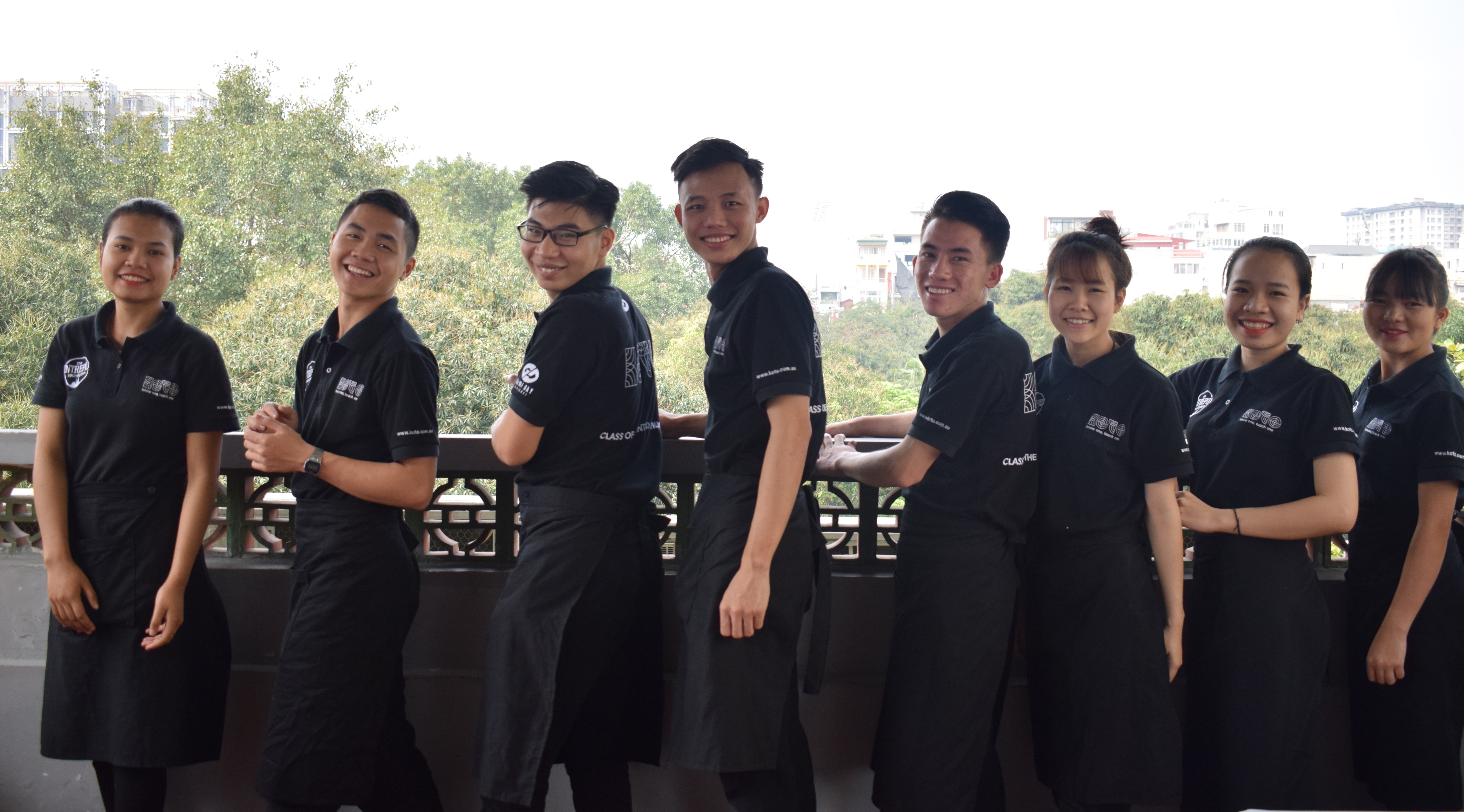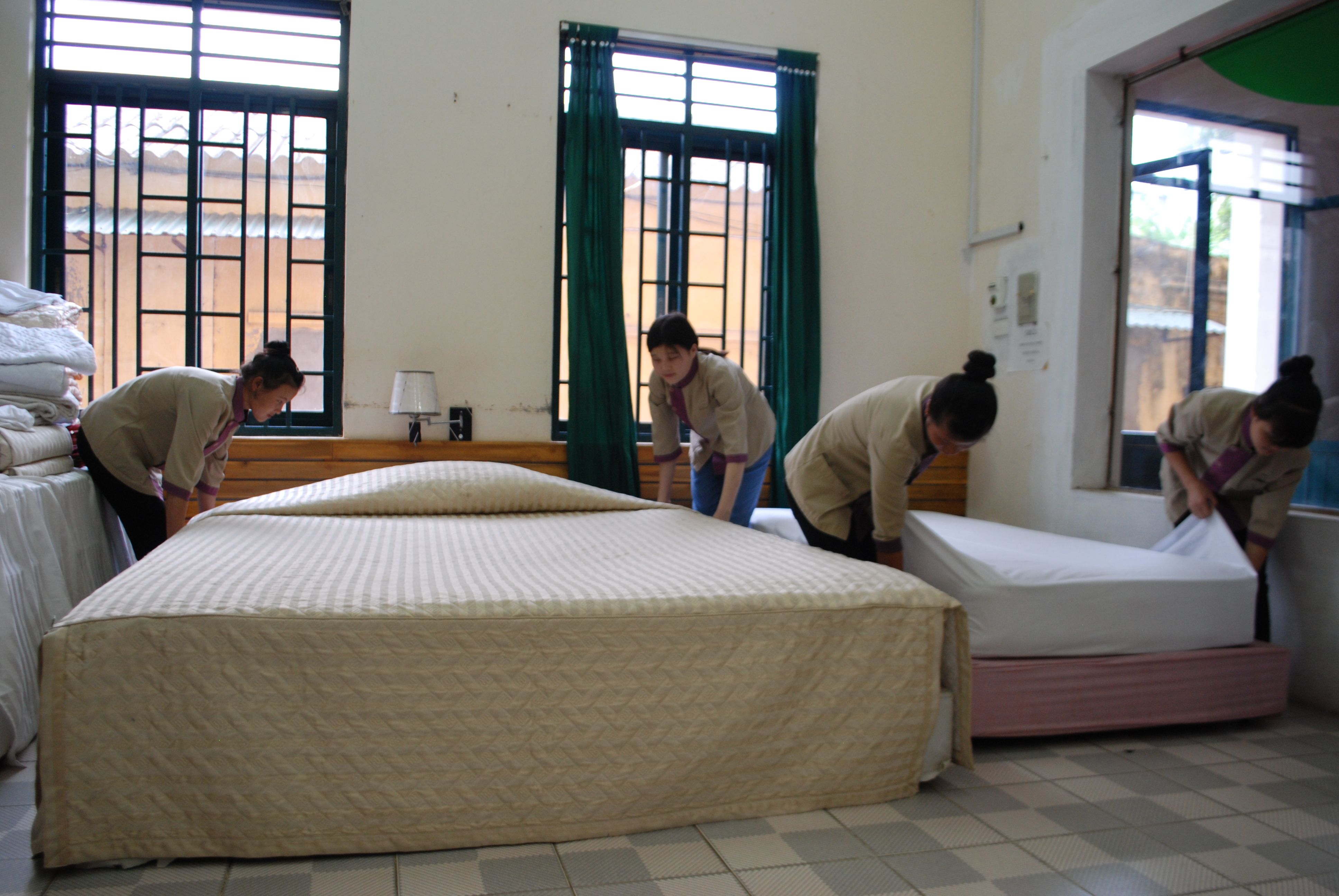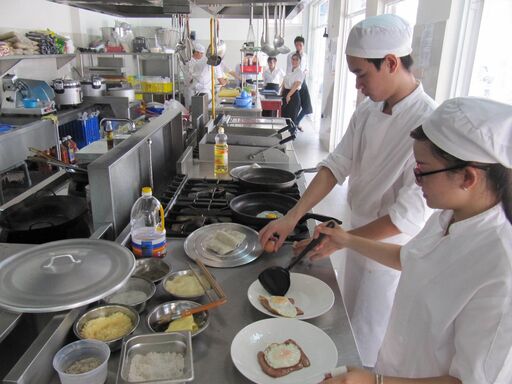By Sophie Hartman, Coordinator of the Association of Southeast Asian Social Enterprises for Training in Hospitality & Catering (ASSET-H&C) & Carson Bolding –
At the age of 11, Duong had to leave his family to make a living by shining shoes and selling newspapers. By chance, he was introduced to Hoa Sua School of the Disadvantaged Youth and received a scholarship for a culinary training program. After graduating, Duong worked at various restaurants across the country. The experience gained allowed him to build an international career and become the leader of the European kitchen at Maxx Royal Hotel, a five-star luxury resort in Turkey.
Meeting a Gap
Duong’s journey demonstrates that the tourism and hospitality industry can provide tremendous leverage for vulnerable people’s economic and social inclusion, if they are provided with skills and sustainable employment opportunities.
While the numbers might be on the lower end at this precise moment due to the measures taken to tackle the corona virus, the number of tourists visiting Southeast Asia are at an all-time high and only expected to increase from here. As this industry grows, it brings more jobs to the region. In 2018, travel and tourism contributed 179.6 million jobs in Asia-Pacific. This figure is expected to increase to 248.5 million jobs over the next ten years[1].

KOTO vocational trainees.
To help combat the labor shortage that has emerged from this rapid and continuing growth, vocational education has become essential. A number of training centers are already stepping in to help fill the gap in labor through the model of social enterprise. By combining a trade school with an income-generating business, such as a hotel, restaurant, or bakery, these centers are able to provide underprivileged people with training in hospitality and catering tailored to the industry’s expectations to allow them to build a brighter future for themselves and their family.
Cannibals with Forks
25 years ago, in his book Cannibals With Forks: The Triple Bottom Line of 21stCentury Business, John Elkington introduced the idea that the performance of a business cannot be measured only in terms of profit and loss. It must also be calculated according to its impact on people’s wellbeing and on our planet. This concept brought greater recognition to the role that businesses can and should play in making the world more sustainable.
This particularly applies to the tourism industry. Drawn by the rich culture, beautiful sights, and good food, the number of tourists visiting Southeast Asia is increasing every year, and so does their awareness of the repercussions of their travels on host populations like the deterioration of natural and cultural heritage.
Customers are increasingly calling on the industry to find ways to ensure that a greater share of benefits reaches the communities in the countries they visit, especially their poorest segments. At their own scale, social enterprises for training in tourism and hospitality provide a concrete response to this request by addressing the 3 Ps of sustainability – People, Profit and Planet.
People:
Before studying at La Boulangerie Française in Hue, Kha was a bricklayer. When he joined the school, he was an extremely shy young men hoping to find a promising job after graduation.
Social enterprises marry the market-driven approach of a business with a social purpose. In the case of social enterprises for training, this aim is to provide vulnerable youth with the necessary skills to successfully integrate into the job market and society.
Keywords to ensure this are accessibility and quality. In these schools, training is free of charge and students are, in most cases, provided with accommodation, food and health care, thus reducing the social and economic barriers to accessing and completing an education.
The schools target at-risk youth, who often lack the skills or knowledge to land a job, keep it, and evolve in their career. Alumni success stories are the result of training targeting a comprehensive development of students. Having learned a combination of technical and transversal competences allowed them to become not only highly skilled professionals, but also responsible and autonomous adults who can take their life into their hands.
In Kha’s case, the program of La Boulangerie Française helped him gain confidence and improve his communication skills. He now works at the InterContinental Hotel in Da Nang and had been elected best employee of 2017 for his outstanding performance, his wonderful enthusiasm and his willingness to learn, grow and perform professionally.
Profit:
Kim Thu followed her passion for food by enrolling in An Rê Mai Sen to become a Restaurant Specialist. She completed an apprenticeship at Le Méridien Saigon, a five-star hotel, where she was offered a position before she even graduated. She started her career as a waitress and hostess at Bamboo Chic, the hotel’s Japanese-Cantonese fusion restaurant. Thanks to this position, she is now autonomous and able to help her family.
Compared to general education, vocational training programs are costly as they bring with them high capital costs, either in terms of facilities or equipment, and they tend to also be more expensive on consumables such as raw material , uniforms, cleaning products, etc.
Given the underfunding of education in international aid and limited State subvention in this field, non-for-profit vocational training centers are urged to find new and innovative models to finance themselves.

Kim trained to become a Restaurant Specialist.
Some of them chose to integrate income-generating activities in their organization. Kim Thu, for instance, took her first steps in hospitality taking customer orders at Mai Sen Bistro. Working in her school’s restaurant as part of her training allowed her to exercise her skills in real conditions.
The restaurant, operated to finance the school’s training activities, also keeps the teaching connected to the reality of the market. Indeed, the obligation to be profitable and keep up with competition prompts the school to constantly align its practices with new trends, quality standards and industry demands.
As Jimmy Pham, founder of KOTO, the first legally recognized social enterprise in Vietnam said “as a social enterprise, you have to deliver what the market needs, help doesn’t come easily. We have to change that mindset. For example, the kids that come to KOTO can’t grow if they think KOTO will propel them to the finish line. Your success is ultimately determined by your hard work, discipline and drive, not because of others’ help. The public must expect that costs will often be higher as training is expensive and we need to empower the youth to realize their potential and often arrive disenfranchised buy society. In addition, we must use quality ingredients to train the hospitality professionals of the future. This all takes time, but the outcomes are so rewarding.”
Planet:

Binh now works as an executive sous-chef at Novotel Suites Hanoi.
Ever since he was a child, Binh knew he wanted to become a chef and cook phở. Unfortunately, when his parents divorced, he dropped out of school and lived on odd jobs. After two years, he decided to get his life back on track and joined KOTO. He obtained his culinary certificate with honors in 2010. He currently works as an executive sous-chef at Novotel Suites Hanoi and has fulfilled his dream by opening a small phở shop with his mother.
On the one hand, tourism is a key sector employing millions of people and significantly adding to local and national economies. On the other hand, while being an industry depending heavily on the planet’s health and attractiveness, it can represent a serious threat to the environment by putting pressure on key resources, like energy and water, and contributing to waste generation, loss of biodiversity and greenhouse gas emissions.
In this context, raising awareness among tourism workers of tomorrow and providing them with keys for action in their future daily working life has become an emergency.
Social enterprises for training have fully understood the role they have to play in shaping a new generation of responsible tourism professionals. Like Binh, many of their graduates will work their way up to managerial roles. In five to ten year, some of them will be managers in major hotels and touristic destinations in the Mekong Subregion or have their own business.
By championing greener and more sustainable tourism practices and incorporating them into their operations to offer students both conducive environments and training on these issues, the schools endeavor to enable these future managers make informed decisions that will take into account environmental considerations.

Learning various skills in hospitality.
Promoting Sustainable Educational Approaches
Across Southeast Asia, in addition to filling a gap in the market, social enterprises for training are helping narrow inequality and create opportunities for disadvantaged populations.
Institut européen de coopération et de développement (IECD) has been working in the region for more than ten years. Experience gained by IECD while supporting different vocational training centers inspired the creation of the Association of Southeast Asian Social Enterprises for Training in Hospitality & Catering (ASSET-H&C).
This association, of which An Rê Mai Sen, Hoa Sua School for Disadvantaged Youth, KOTO and La Boulangerie Française are members, consists in a regional network of support for 14 social businesses that promote the personal and professional development of vulnerable young people in the tourism and hospitality sector.
To help these training centers increase their impact, ASSET-H&C assists its members by facilitating exchanges between schools, providing expertise, and promoting these establishments and their common vision of training and tourism. Over the past four years, the network has, for instance, allowed 12 teacher or student exchanges between schools. 48 representatives of schools’ management teams have also participated in at least one ASSET-H&C annual seminar aimed at sharing and exchanging on best practices.
The approach taken by ASSET-H&C members creates a win-win situation. Students receive training and find work, consumers get access to quality services and products, and the influx of income benefits the surrounding community.
Building Bridges
Going back to John Elkington and his quote that “We have to build bridges, not walls”, vocational training and social entrepreneurship in the tourism sector are definitely bridge builders on filling human capital development gap; on building businesses; and on creating a stronger sustainability agenda.
As these training centers continue to take on new students, every person can support these social entrepreneurs whether it is a tourist or a resident. In Vietnam, companies can have events catered by Hoa Sua School for the Disadvantaged Youth; you can grab a bite at La Boulangerie Française; have lunch at Mai Sen Bistro or take friends for dinner at KOTO restaurant.
Together we can build a sustainable future. See you there!

At Mai Sen Bistro.
For more information:
Don’t hesitate to check http://assethc.org/get-involved/visit-the-social-businesses/to find out about ASSET-H&C members in neighboring countries before planning your next getaway to Cambodia, Laos, Myanmar or Thailand.
[1]World Travel & Tourism Council. (2019). Asia-Pacific 2019 Annual Research: Key Highlights. Asia-Pacific 2019 Annual Research: Key Highlights. London.


10 comments
[…] Click to read in her words together with Carson Bolding – Tourism, Social Entrepreneurship & Sustainability: How Vocational Training is Filling a Gap. […]
Thank you for sharing!
Hi Sophie
Great news! When I was Project Leader in Vietnam we had an association with How Sua and KOTO and I lived not far from Donkey Kong Bakery. The social enterprise initiatives in this country are a model for other countries. Regards Steve
Thanks for sharing such a blog!
King regards,
Harrell Dencker
Very energetic post, I liked that a lot. Will there be a part 2?
Very valuable information, it is not at all sites that
we find this, congratulations I was looking for something like
this and found it here.
King regards,
Thompson Raahauge
Thank you for your feedback!
Very interesting, very good job and thanks for sharing such a good blog.
Best regards,
Thomassen Griffin
I have read several just right stuff here. Certainly worth bookmarking for revisiting.
I wonder how much effort you place to make this type of magnificent informative site.
My brother suggested I might like this website. He was totally right.
This post truly made my day. You can not imagine simply how much time I had spent
for this info! Thanks!